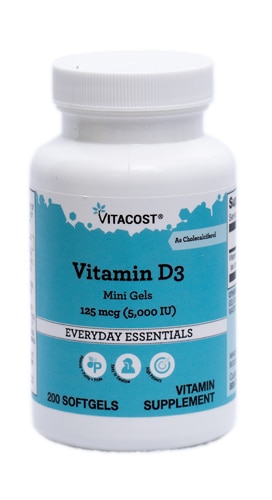Think of your bones in the same light as the framework of your house. They create the structure that makes you uniquely you. For that reason alone, your bones should be given the TLC they deserve. But drinking milk and exercising regularly aren’t enough, and it’s a challenge to get sufficient vitamin D in your diet. Make no bones about it, calcium and vitamin D supplements may be your best source of these key nutrients, which begs the question: How do you choose the right ones?
Calcium:
According to the National Institutes of Health, calcium and vitamin D needs change as you age. Infants up to six months only need 200 mg of calcium each day. Starting at 12 months, the number more than triples to 700 mg. The requirements continue to rise with age and vary depending on gender. Women ages 51 to 70 years old, for example, should aim for 1,200 mg of calcium daily.
Once you’ve established how much calcium your body should take (factoring in your dietary consumption), look for a supplement that can help pick up the slack with the best rate of absorption. To achieve optimum absorption, choose a chelated calcium formula. This means that the nutrient has a compound attached to the metal in order to help it survive stomach acids and enzymes, so that it can more easily be taken in by the small intestine. Without a chelator, your body would allow most of the calcium to pass through your natural waste.
It’s important to note that there are different chelators in calcium supplements. Calcium citrate, for instance, is chelated with citrate, which aids in absorption by increasing its acidity. If constipation is an uncomfortable side effect of supplementing with calcium, calcium citrate is the best choice for you. On the other hand, calcium carbonate is the better chelated mineral for those who tend to experience loose stool when taking this essential mineral. Calcium can also be chelated with amino acids, or proteins, to provide maximum absorption power.
Vitamin D:
Vitamin D recommendations aren’t nearly as age-specific as they are with calcium. The Recommended Daily Allowance (RDA) for people ages 4 to 70 is 600 IU every day and 800 IU for anyone over 71. Vitamin D is a nutrient your body makes when exposed to sunlight. However, not everyone lives in a climate with enough sunshiny days. This is where a supplement becomes crucial. Plus, vitamin D is not only an important nutrient for bone health, but supports your immune system and overall well-being.*
If you’ve shopped for vitamin D supplements before, you may have noticed two different forms: ergocalciferol (D2) and cholecalciferol (D3). Ergocalciferol is the vegetarian source of D, as it’s derived from yeast. Though often referred to as the preferred form of D, cholecalciferol comes from an animal source. If choosing vegetarian supplements is a priority, ergocalciferol will sufficiently support your vitamin D levels.
You'll find vitamin D and calcium supplements in all shapes and forms. Flavorful calcium chewables are a popular choice, for instance. And vitamin D drops are a favorite, particularly for fast-growing children. Depending on your unique needs, you can absolutely take calcium and vitamin D separately. But don't forget there are combination formulas available, which may be more convenient (one less pill!) to take on a regular basis. Plus, when it comes to bone health, you wouldn't want to miss out on either one of these nutrients.
*These statements have not been evaluated by the FDA. These products are not intended to diagnose, treat, cure or prevent any disease.




